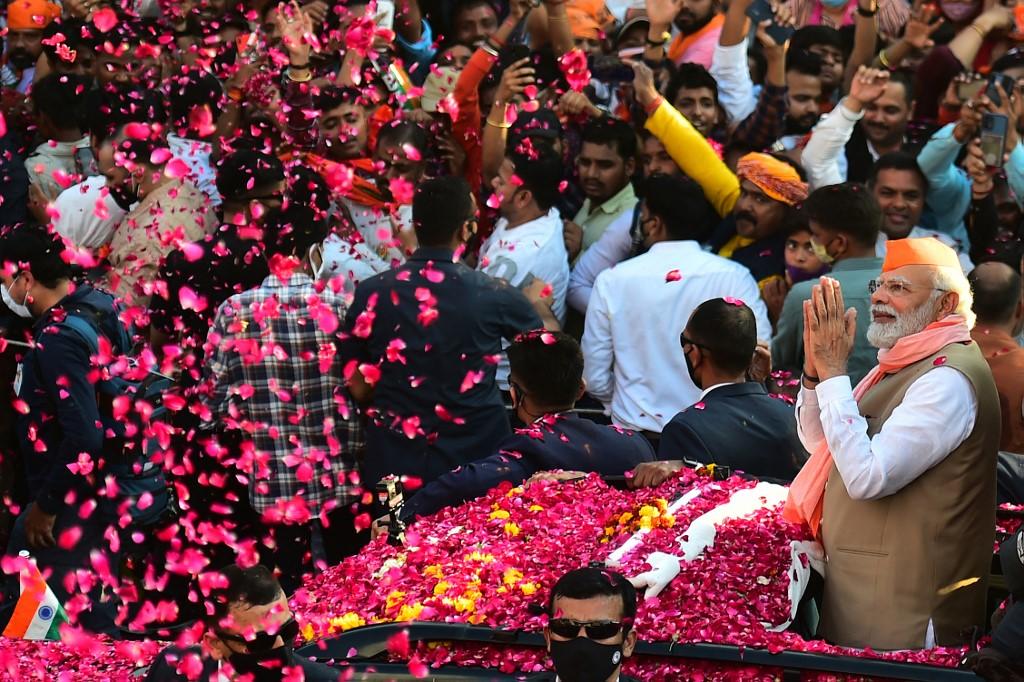NEW DELHI: Prime Minister Narendra Modi’s Hindu nationalist party had a commanding lead in India’s most populous state as votes were counted Thursday, despite his government’s criticized handling of COVID-19, soaring unemployment and farmer protests.
Trends in the poll data shared by India’s Election Commission showed the Bharatiya Janata Party comfortably leading in Uttar Pradesh state in polls that were seen as a crucial test for Modi’s popularity before national elections in 2024. Modi’s BJP was also ahead in three more states, while India’s main opposition party Congress was facing a rout in Punjab, data showed.
The final tally for five states — Uttar Pradesh, Punjab, Uttarakhand, Manipur and Goa — where voters went to the polls over a month to cast their ballots was expected by Thursday evening at the earliest.
Thursday’s results, particularly in Uttar Pradesh, are seen as a referendum on Modi’s popularity and a resounding endorsement of his party’s Hindu-first politics. They will also dent the hopes of India’s opposition parties which are banking to form a united front to challenge Modi in the next general elections.
The key northern state of Uttar Pradesh is governed by Yogi Adityanath, a highly divisive Hindu monk-turned-politician whose rise has been marked by anti-Muslim rhetoric and violence. He is expected to return as the chief minister of the state, as poll data suggested Modi’s party was ahead in about 255 of the 403 seats — well beyond the simple majority to form a government.
In the last Uttar Pradesh state election in 2017, the BJP and its allies swept the polls. The results then were widely credited to Modi’s popularity and Hindu-first politics, and he returned as prime minister for a second straight term in the 2019 general election.
Bellwether Uttar Pradesh sends 80 legislators to India’s Parliament, the most from any state. Polls there have been long assumed as a crucial vote ahead of national elections.
Modi’s party has been under immense pressure to steer an economy that was sputtering even before the COVID-19 pandemic, with unemployment being a key issue among voters. The elections were also the first after a calamitous surge in infections sparked anger, with many accusing the Adityanath government of mismanagement.
In the lead-up to the polls in Uttar Pradesh, the party promised to spur development and wooed voters with welfare measures. Its core message, however, banked on big-ticket projects that combine religion with infrastructure — projects analysts say were aimed at pleasing the BJP’s Hindu base. But uncertainties about the vote outcome had been raised by multiple defections to the main opposition in the state, the Samajwadi Party, whose secular appeal pulled voters from a wide range of castes as well as the Muslim community.
Before the polls, questions were also raised whether farmers, an influential voting bloc, would rally behind the BJP. Many farmers were still furious at Modi for pushing through agriculture laws that triggered a yearlong protest before he bowed to the pressure and revoked them in November.
This anger also set the tone for polls in nearby Punjab state, considered the “grain bowl” of India, and where the Aam Aadmi Party, which was formed in 2013 to eliminate corruption and has since ruled the national territory of Delhi for two consecutive terms, was fighting to oust the opposition Congress party.
The poll trends in Punjab showed a resounding win for the Aam Aadmi Party. It was leading in about 88 of the 117 seats.
Aam Aadmi Party leaders said they were now ready to take on Modi nationally.
“I see AAP becoming a national force. AAP is going to be the national and natural replacement of the Congress,” the party’s spokesperson Raghav Chadha told New Delhi Television news channel.
Narendra Modi’s ruling BJP ahead in crucial state polls in India




